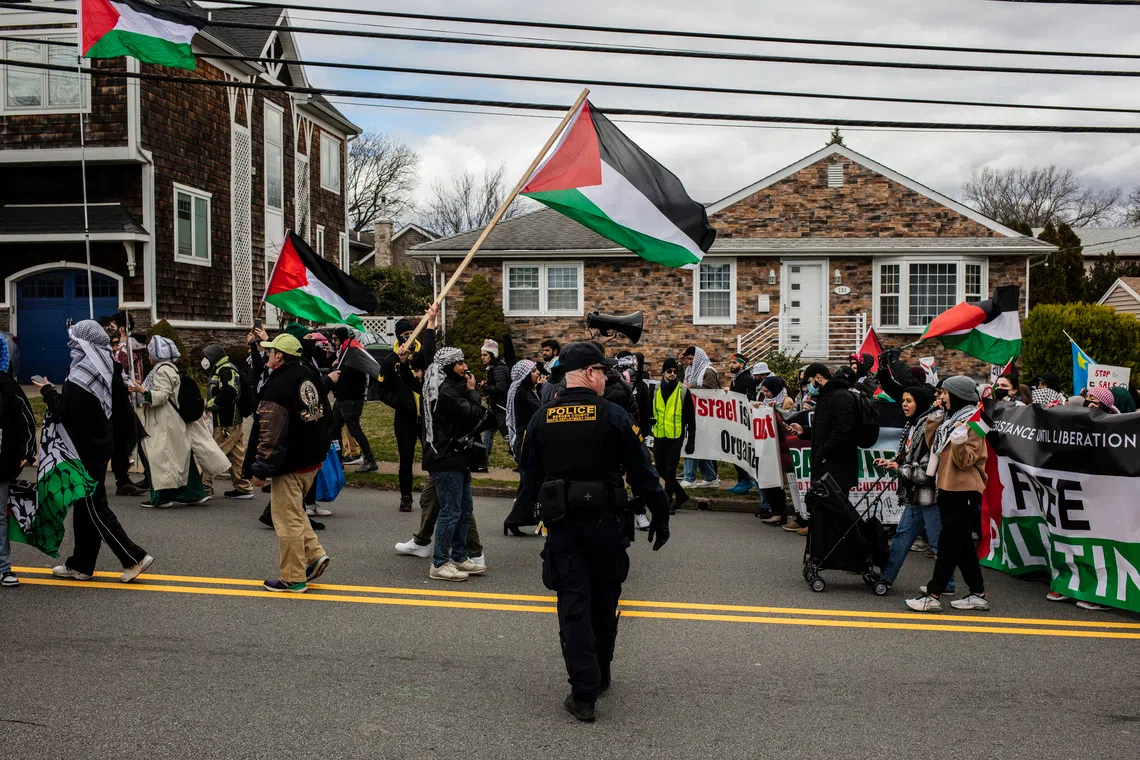US sues pro-Palestinian demonstrators who protested outside synagogue
Sign up now: Get ST's newsletters delivered to your inbox

Palestinian demonstrators marching in Teaneck, New Jersey, on March 10, 2024.
PHOTO: BRYAN ANSEL/NYTIMES
Jonah E. Bromwich
Follow topic:
WASHINGTON - The Trump administration is repurposing a law traditionally used to shield reproductive health clinics to pursue a civil case against pro-Palestinian demonstrators, taking a side in a dispute that roiled New Jersey in 2024.
The Justice Department’s Civil Rights Division on Sept 29 filed a lawsuit against two New Jersey advocacy groups and six people who protested outside a synagogue, accusing them of engaging in a “coordinated effort to intimidate and disrupt Jewish worshippers at a religious event”.
Mr Wassim Kanaan, chairman of one of the groups, American Muslims for Palestine-New Jersey, declined to comment. In the past, he has said that such protests have “nothing to do with the Jewish faith” and are directed at “the policies of the state of Israel and its treatment of Palestinians”. The other defendants could not immediately be reached for comment.
The events the suit describes took place in November in West Orange, New Jersey, about 32km west of New York City’s Manhattan borough. Pro-Palestinian demonstrators had gathered to protest against a real estate fair, at which property in Israel and in the West Bank was expected to be offered. Such shows have been held for decades, but they have taken on new symbolism during Israel’s war in the Gaza Strip, setting off fierce protests across New Jersey.
The November protest was particularly contentious. Masked protesters holding plastic horns, called vuvuzelas, and signs reading “Stop the Sale of Stolen Palestinian Land” clashed with pro-Israel counter-protesters outside Congregation Ohr Torah, an Orthodox synagogue in the neighbourhood.
Ultimately, two pro-Israel demonstrators were charged with aggravated assault, including one, Moshe Glick, who the authorities said hit a demonstrator in the head with a torch, sending him to the hospital.
The Justice Department’s lawsuit, however, takes aim squarely at the pro-Palestinian demonstrators, seeking to bar them from protesting outside houses of worship and asking that they each pay tens of thousands of dollars for violating the law.
The suit could represent a new front in the administration’s crackdown on pro-Palestinian speech. It makes novel use of a 1994 law, the Freedom of Access to Clinic Entrances Act, or Face Act. The law bars demonstrators from using or threatening force to intimidate, injure or interfere with people who are seeking or providing reproductive health services – and people who are seeking to exercise their First Amendment rights at a place of worship.
Mr Harmeet Dhillon, the head of the department’s Civil Rights Division, announced the lawsuit in a news conference in Washington on Sept 29. She acknowledged that it represented the department’s first use of the Face Act against demonstrators outside a house of worship. She added that criminal charges were not out of the question and suggested that the groups that had been sued might be the subject of further investigation.
“These violent protesters meant their actions for evil, but we will use this case to bring forth good: the protection of all Americans’ religious liberty,” she said. “We’re excited to see this case unfold – and hope that other instances may also come under our scrutiny.”
The clinic entrance act, as its name suggests, has historically been used to protect the rights of women seeking reproductive healthcare, after violent episodes targeting abortion providers in the 1980s and 1990s. As recently as January 2024, a jury convicted six defendants charged with Face Act offences for blockading a clinic in Mount Juliet, Tennessee.
But upon taking office, US President Donald Trump pardoned several anti-abortion activists charged with Face Act offences, and his Justice Department signalled that it would strictly limit enforcement – at least for the law’s traditional purpose.
Instead, in March, the department indicated that it might use the law to take on pro-Palestinian demonstrations. It filed a statement of interest in a civil case in California in which various groups, including the Palestinian Youth Movement, were accused of violating the Face Act.
Republican legal scholars and politicians have called for the Face Act to be used more aggressively to protect places of worship. In May 2024, eight members of Congress signed a letter to then Attorney-General Merrick Garland pushing for such enforcement. One of them, Republican Representative John Rutherford of Florida, asserted that the Justice Department at that point had “failed to prosecute a single act of violence against places of religious worship” under the act. The letter listed as an example a pro-Palestinian demonstration at St Patrick’s Cathedral in New York City.
The Face Act specifies that it cannot be construed to block exercises of free speech, including “peaceful picketing or other peaceful demonstration”, and it is unclear whether the administration’s lawsuit will be successful. The events of the protest in New Jersey have been hotly contested since it took place, and videos and photos from the scene do not make clear exactly how the violence began.
The Justice Department’s lawsuit suggests that it started with the vuvuzelas. It says that the protesters – including one of the defendants, Mr Altaf Sharif – used them as weapons, blowing them loudly into the counterprotesters’ ears.
The suit says that Mr Sharif charged at Glick, and was then pepper-sprayed by another counter-protester, David Silberberg, whom he grabbed and placed in a chokehold. But while the lawsuit asserts that Mr Sharif was the aggressor, the Essex County Prosecutor’s Office charged Glick and Silberberg with aggravated assault, bias intimidation and weapons offences.
In a statement on Sept 29, Glick said the Justice Department lawsuit had shown that “the real violations were committed by those who intimidated, blocked and attacked a member of the community in front of a synagogue.” He said his indictment had been “improperly obtained” and that his “defence team is confident it will be dismissed”. NYTIMES

